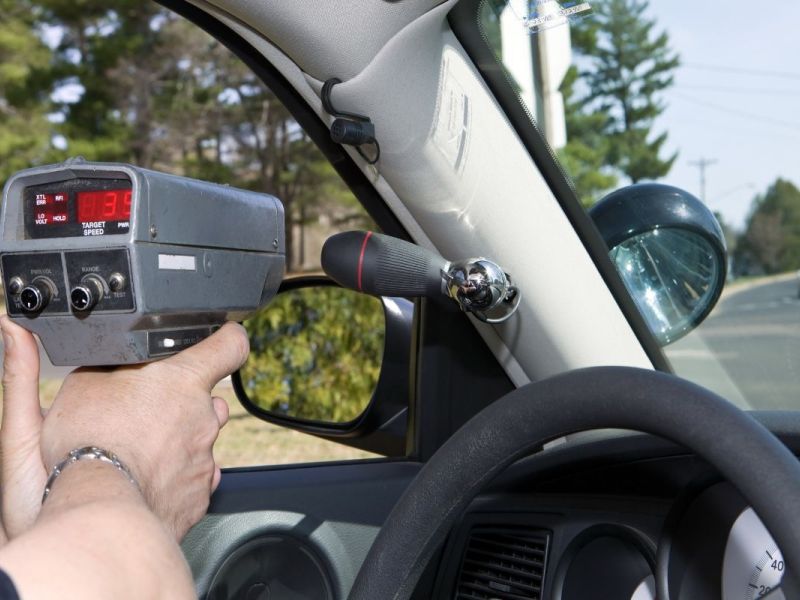
— Speeding
How Radar and Lidar Guns Work (And How They Can Be Wrong)
Have a traffic ticket and need to take driver improvement?
Take a look at our DMV-approved driving course.
It is a relatively common sight on Virginia roadways: a police officer in their patrol car, aiming a radar gun at oncoming traffic. While radar and lidar guns are useful tools for detecting speeding vehicles, they have their weaknesses. If you have received a speeding ticket based on a radar or lidar gun reading, you may be able to challenge this evidence in court and reduce or dismiss your ticket. Successfully doing so, however, requires a deep understanding of Virginia law and a great deal of evidence.
At Driving Defense Law, we have successfully represented countless clients as they challenge their radar or lidar gun speeding ticket. Through our legal advocacy, we have been able to reduce and dismiss speeding tickets using a range of proven defenses. Radar errors occur, and we are here to help you prove it. To discuss your situation with our team of experienced attorneys, consider contacting us at (757) 929-0335 today.
What Is a Radar Gun?
RADAR stands for radio detection and ranging, is a technology that is used by law enforcement to measure the speed to moving vehicles. Radar guns are able to calculate the distance between an object and the gun itself by emitting a wave and determining how much time it takes the wave to return to the source. Generally, radar guns are considered easy to use and reliable, making them a preferred tool of police officers looking to catch a motorist speeding.
What Is a Lidar Gun?
LiDAR stands for light detection and ranging, and works similar to radar in many ways. While radar uses a wave to determine speed, lidar uses a laser. A laser is emitted from the gun, bounces off the object, and returns to the source. The amount of time it takes for the laser to leave and return to the gun is used to determine the speed of a moving object. Due to their accuracy, especially in heavy traffic, lidar speed guns have become highly popular in law enforcement.
How Can Radar and Lidar Guns Get It Wrong?
Regardless of which method a police officer was using to determine your speed, radar and lidar guns are not infallible. Three of the most common reasons why radar and lidar guns produce a false reading include:
- The radar or lidar gun was improperly calibrated. If either of these tools were not properly – or recently – calibrated, they can yield an inaccurate reading. According to the Code of Virginia § 46.2-882, radar and lidar devices must be calibrated at least every six months.
- Poor weather conditions. High winds, heavy rain, and other inclement weather can lead to radar errors.
- User error. A police officer who has not been properly trained to use a radar gun is likely to incorrectly aim the radar gun, causing it to read another vehicle other than yours. If the other vehicle was speeding, you may be mistakenly issued a speeding ticket.
- Radio frequency interference, mechanical interference, and cosine angle error. It is not uncommon for devices to produce an incorrect reading due to interference sources and misalignment.
Should I Challenge My Radar or Lidar Gun Speeding Ticket?
At Driving Defense Law, we advocate for our clients’ rights and help them minimize their speeding charges. When you simply pay your speeding ticket, you are admitting guilt and welcoming a host of serious consequences. Deciding whether to challenge a radar or lidar gun speeding ticket can be boiled down to a cost-benefit analysis. Is it worth it to challenge your ticket? To determine this, consider the following consequences of pleading guilty to speeding in Virginia:
- Increased insurance rates. When you pay your speeding ticket, you are agreeing to accrue points on your license. Insurance companies look at your driving record when determining rates. Considering that the national car insurance rate increase for drivers who receive a speeding ticket is 24%, this is a major consequence of pleading guilty to speeding.
- License suspension. Virginia uses a demerit point system. If you accrue too many points on your license in too short of a time period, your license can be suspended. This can prevent you from moving freely around your community and force you to use more expensive transportation options.
- Misdemeanor charges. Unlike other states, speeding can be charged as reckless driving in Virginia. This offense is considered a criminal misdemeanor charge, which is punishable by jail time, steep fines, probation, and the creation of a criminal record.
How Can Driving Defense Law Challenge a Radar or Lidar Gun Reading
While radar and lidar gun readings can be compelling proof in court, our attorneys understand how to effectively challenge this evidence by leveraging effective speeding ticket defense strategies. Some of the ways we have successfully challenged radar and lidar gun readings in court include:
- Proving that the calibration certificate for the radar or lidar gun is out of date or was completed incorrectly. This is one of the most effective defense strategies for speeding tickets, as it is common for law enforcement to fail to recalibrate their devices during the specified timeframe.
- Demonstrating that the police officer did not receive the proper training to use the radar or lidar gun.
- Citing a margin of error, which is particularly effective in reckless driving cases where the driver was close to the speed threshold.
- Investigating if weather conditions played a role in the radar error.
Craft Your Defense with an Experienced Attorney at Driving Defense Law
Whether it is due to a flaw in the technology or improper use of the device, radar errors occur. Receiving a ticket due to a false radar or lidar reading can be frustrating, and you likely want to avoid the consequences of being convicted of speeding in Virginia. At Driving Defense Law, our team of experienced attorneys understand how to craft the strongest defense for your case, compiling all necessary evidence and effectively protecting your rights in court. To begin crafting your legal defense with our team, consider calling or texting us at (757) 929-0335 to book your free case evaluation today.

